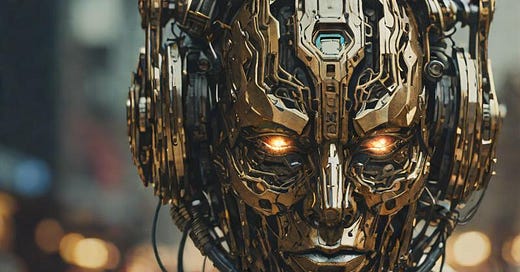The Belief in the 'Perfect Algorithm': Ironic, Obvious and Quite Sad
From Abhivardhan, our Chairperson
This is a post authored by Mr Abhivardhan, our Founder and Chairperson.
Late post yet satisfying.
I came across a fantastic piece on AI governance by Sanjeev Sanyal.
Let's discuss that.
This belief in the perfect algorithm is behind efforts that range from “Five Year Plans” and Karl Marx’s dialectic explanation of history to confident television punditry on everything from geopolitics to stock markets.
Oh absolutely - fintech and banking have some amazing #artificialintelligence (AI) use cases which we must look forward to. They are specific, close-ended and helpful enough.
One area where there is already a great deal of enthusiasm about the ability of AI to mine data is in the field of finance. Fintech startups and even traditional banks are taken up with the idea that once algorithms have extensively mined piles of data, it would be possible to mechanically make the perfect loan decision.
Yes, this comes from a mentality to control.
Second, different AI models will likely also arrive at similar conclusions if they are fed similar data pools. This means that it will cause self-reinforcing loops that could lead to systemic group-think, excessive concentration and blind spots.
We can all see how this happens with social media algorithms. It is more than likely that something similar will happen with fintech algorithms.
I completely agree with this insight - I have had podcast discussions on The Bharat Pacific with Dr. Jeffrey Funk, Bogdan Grigorescu, Richard Self and other stalwarts (watch the AI Now podcast here: https://www.youtube.com/playlist?list=PL3J-U-8YcaB2YcqNrcocEs-HmdrGn7on2).
Read this insight at https://swarajyamag.com/tech/ai-is-a-good-slave-but-bad-master
You can also purchase my book on AI and International Law at https://amzn.eu/d/fRZi2r4
Meanwhile, in case you think about copyright issues related to whatever text ChatGPT or Gemini produces, read this.
Artificial Intelligence (AI) has significantly disrupted the competitive marketplace, particularly in the realm of text generation. AI systems like ChatGPT and Bard have been used to generate a wide array of literary and artistic content, including translations, news articles, poetry, and scripts[8]. However, this has led to complex issues surrounding intellectual property rights and copyright laws[8].
Copyright Laws and AI-Generated Content
AI-generated content is produced by an inert entity using an algorithm, and therefore, it does not traditionally fall under copyright protection[8]. However, the U.S. Copyright Office has recently shown openness to granting ownership to AI-generated work on a "case-by-case" basis[5]. The key factor in determining copyright is the extent to which a human had creative control over the work's expression[5].
The AI software code itself is subject to copyright laws, and this includes the copyrights on the programming code, the machine learning model, and other related aspects[8]. However, the classification of AI-generated material, such as writings, text, programming code, pictures, or images, and their eligibility for copyright protection is contentious[8].
Legal Challenges and AI
The New York Times (NYT) has recently sued OpenAI and Microsoft for copyright infringement, contending that millions of its articles were used to train automated chatbots without authorization[2]. OpenAI, however, has argued that using copyrighted works to train its technologies is fair use under the law[6]. This case highlights the ongoing legal battle over the unauthorized use of published work to train AI systems[2].
Paraphrasing and AI
Paraphrasing tools, powered by AI, have become increasingly popular. These tools can rewrite, enhance, and repurpose content while maintaining the original meaning[7]. However, the use of such tools has raised concerns about the potential for copyright infringement and plagiarism.
To address this, it is suggested that heuristic and semantic protocols be developed for accepting and rejecting AI-generated texts[3].
Read the complete insight at https://www.indicpacific.com/post/ai-generated-texts-and-the-legal-landscape-a-technical-perspective





